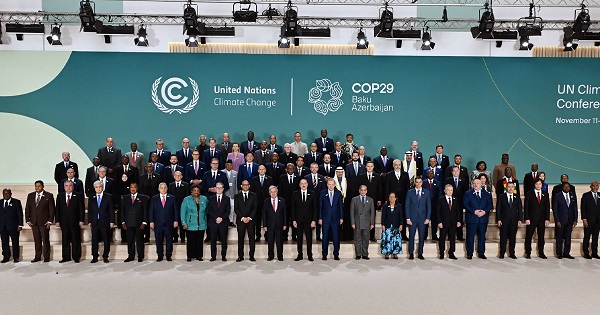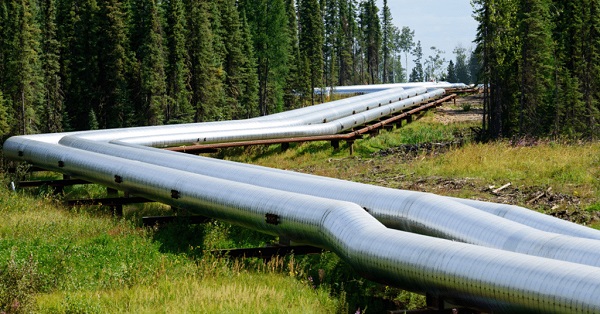Dan McTeague
COP29 was a waste of time

From Canadians For Affordable Energy

The twenty-ninth edition of the U.N. Climate Change Committee’s annual “Conference of the Parties,” also known as COP29, wrapped up recently, and I must say, it seemed a much gloomier affair than the previous twenty-eight. It’s hard to imagine a more downcast gathering of elitists and activists. You almost felt sorry for them.
Oh, there was all the usual nutty Net-Zero-by-2050 proposals, which would make life harder and more expensive in developed countries, and be absolutely disastrous for developing countries, if they were even partially implemented. But a lot of the roughly 65,000 attendees seemed to realize they were just spewing hot air.
Why were they so down? It couldn’t be that they were feeling guilty about their own hypocrisy, since they had flown in, many aboard private jets, to the Middle Eastern petrostate of Azerbaijan, where fossil fuels count for two-thirds of national GDP and 90% of export revenues, to lecture the world on the evils of flying in planes and prospering from the extraction of oil and natural gas. Afterall, they did the same last year in Dubai and there was no noticeable pang of guilt there.
It’s likely that Donald Trump’s recent reelection had a lot to do with it. Living as they do in a media bubble, our governing class was completely blindsided by the American people’s decision to return their 45th president to the White House. And the fact that he won the popular vote this time made it harder to deny his legitimacy. (Note that they’ve never questioned the legitimacy of Justin Trudeau, even though his party has lost the popular vote in the past two federal elections. What’s the saying about the modern Left? “If they didn’t have double standards, they’d have no standards at all.”)
Come January, Trump is committed to (once again) pulling the U.S. out of the Paris Climate Accords, to rolling back the Biden Administration’s anti-fracking and pro-EV regulations, and to giving oil companies the green light to extract as much “liquid gold” (his phrase) as possible, with an eye towards making energy more affordable for American consumers and businesses alike. The chance that they’ll be able to leech billions in taxpayer dollars from the U.S. Treasury while he’s running the show is basically zero.
But it wasn’t just the return of Trump which has gotten the climate brigade down. After a few years on top, environmentalists have been having one setback after another. Green parties saw a huge drop off in support in the E.U. parliament’s elections this past June, losing one-third of their seats in Brussels.
And wherever they’ve actually been in government, in Germany and Ireland for instance, the Greens have dragged down the popularity of the coalitions they were part of. That’s largely because their policies have been like an arrow to the heart of those nations’ economies – see the former industrial titan Germany, where major companies like Volkswagen, Siemens, and the chemical giant BASF are frantically shifting production to China and the U.S. to escape high energy costs.
But while voters around the world are kicking climate ideologues to the curb, there are still a few places where they’re managing to cling to power for dear life.
Here in Canada, for instance, Justin Trudeau and Steven Guilbeault steadfastly refuse to consider revisiting their ruinous Net Zero policies, from their ever-increasing Carbon Tax, to their huge investments in Electric Vehicles and the mandates which will force all of us to buy pricey, unreliable EVs in just over a decade, and to the emissions caps which seek to strangle the natural resource sector on which our economy depends.
Minister Guilbeault was all-in on COP29, heading the Canadian delegation, which “hosted 65 events showcasing Canada’s leadership on climate action, nature-based solutions, sustainable finance, and Canadian clean technologies—while discussing gender equality, youth perspectives, and the critical role of Indigenous knowledge and climate leadership” and stood up for Canadian values such as “2SLGBTQI+” and “gender inclusivity.” Once again, in Azerbaijan, which has been denounced for its human rights abuses.
And no word yet on the cost of all of this – for last year’s COP28 the government – or should I say the taxpayers – spent $1.4M on travel and accommodations alone for the 633 member delegation. That number, not counting the above mentioned events, are sure to be higher, as Azerbaijan is much less of a travel destination than Dubai, and so has fewer flights in and available hotel rooms.
At the same time all of this was going on, Trudeau was 12,000 kms away in Rio de Janeiro, Brazil, telling an audience that carbon taxation is a “moral obligation” which is more important than the cost of living: “It’s really, really easy when you’re in a short-term survive, [to say] I gotta be able to pay the rent this month, I’ve gotta be able to buy groceries for my kids, to say, OK, let’s put climate change as a slightly lower priority.”
This is madness, and it underscores how tone-deaf the prime minister is, and also why current polling looks so good for the Conservatives that Pierre Poilievre might as well start measuring the drapes at the PMO.
He has the Trudeau Liberals’ obsessive pursuit of Net Zero policies in large part to thank for that.
The world is waking up to the true cost of the Net Zero ideology, and leaving it behind. That doesn’t mean the fight is over – the activists and their allies in government are going to squeeze as many tax dollars out of this as they possibly can. But the writing is on the wall, and their window is rapidly closing.
Dan McTeague is President of Canadians for Affordable Energy.
Dan McTeague
Will this deal actually build a pipeline in Canada?

By Dan McTeague
Will Carney’s new pipeline deal actually help get a pipeline built in Canada? As we said before, the devil is in the details.
While the establishment and mainstream media cheer on the new pipeline agreement, there are specific details you need to be aware of.
Dan McTeague explains in his latest video.
Business
Liberal’s green spending putting Canada on a road to ruin

Once upon a time, Canadians were known for our prudence and good sense to such an extent that even our Liberal Party wore the mantle of fiscal responsibility.
Whatever else you might want to say about the party in the era of Jean Chrétien and Paul Martin, it recognized the country’s dire financial situation — back when The Wall Street Journal was referring to Canada as “an honorary member of the Third World” — as a national crisis.
And we (remember, I proudly served as Member of Parliament in that party for 18 years) made many hard decisions with an eye towards cutting spending, paying down the debt, and getting the country back on its feet.
Thankfully we succeeded.
Unfortunately, since then the party has been hijacked by a group of reckless leftwing fanatics — Justin Trudeau and his lackeys — who have spent the past several years feeding what we built into the woodchipper.
Mark Carney’s finally released budget is the perfect illustration of that.
The budget is a 400 page monument to deficit delusion that raises spending to $644.4 billion over five years — including $141.4 billion in new spending — while revenues limp to $583.3 billion, yielding a record (non-pandemic) $78.3 billion shortfall, an increase of 116% from last year.
This isn’t policy; it’s plunder. Interest payments alone devour $55.6 billion this year, projected to hit $76.1 billion by 2029-30 — more than the entire defence budget and rising faster than healthcare transfers.
We can’t discount the possibility that this will lead to a downgrade of our credit rating, which will significantly increase the cost of borrowing and of doing business more generally.
Numbers this big start to feel very abstract. But think of it this way: that is your money they’re spending. Ottawa’s wealth is made up entirely of our tax dollars. We’ve entrusted that money to them with the understanding that they will use it responsibly. In the decade these Liberals have been in power, they have betrayed that trust.
They’ve pursued policies which have made life in Canada increasingly unaffordable. For example, at the time of writing it takes 141 Canadian pennies (up from 139 a few days ago) to buy one U.S. dollar, in which all of our commodities are priced. Well, that’s .25 cents per litre of gasoline. Imagine what that’s going to do to the price of heating, of groceries, of the various other commodities which we consume.
And this budget demonstrates that the Carney era will be more of the same.
Of course, the Elbows Up crowd are saying the opposite — that this shows how fiscally responsible Mark Carney is, unlike his predecessor. (Never mind that they also publicly supported everything that Trudeau did when he was in government.) They claim that Carney shows that he’s more open to oil and gas than Trudeau was.
Don’t believe it.
The oil and gas sector does get a half-hearted nod in the budget with, for instance, a conditional pathway to repeal the emissions cap. But those conditions are important. Repeal is tied to the effectiveness of Carney’s beloved industrial carbon tax. If that newly super-charged carbon tax, which continues to make our lives more expensive, leads to government-set emissions reductions benchmarks being met, then Ottawa might — might — scrap the emissions.
Meanwhile, the budget doubles down on the Trudeau government’s methane emissions regulations. It merely loosens the provisions of the outrageous Bill C-59, an act which should have been scrapped in its entirety. And it leaves in place the Trudeaupian “green” super structure, which has resource sector investment, and any business that can manage it, fleeing to the U.S.
In these perilous times, with Canada teetering on the brink of recession, a responsible government would be cutting spending and getting out of the way of our most productive sectors, especially oil and gas — the backbone of our economy.
It would be repealing the BC tanker ban and Bill C-69, the “no more pipelines act,” so that our natural resources could better generate revenue on the international market and bring down energy rates at home.
It would quit wasting millions on Electric Vehicle charging stations; mandating that all Canadians buy EVs, even with their elevated cost; and pressuring automakers to manufacture Electric Vehicles, regardless of demand, and even as they keep closing up shop and heading south.
But in this budget the Liberals are going the opposite direction. Spend more. Tax more. Leave the basic Net-Zero framework in place. Rearrange the deck chairs on the Titanic.
They’re gambling tomorrow’s prosperity on yesterday’s green dogma, And every grocery run, every gas fill-up, every mortgage payment will serve as a daily reminder that we are the ones footing the bill.
Once upon a time, the Liberals knew better. We made the hard decisions and got the country back on its feet. Nowadays, not so much.
-

 MAiD2 days ago
MAiD2 days agoFrom Exception to Routine. Why Canada’s State-Assisted Suicide Regime Demands a Human-Rights Review
-

 Business2 days ago
Business2 days agoCarney government should privatize airports—then open airline industry to competition
-

 Business2 days ago
Business2 days agoWhat’s Going On With Global Affairs Canada and Their $392 Million Spending Trip to Brazil?
-

 Bruce Dowbiggin6 hours ago
Bruce Dowbiggin6 hours agoIntegration Or Indignation: Whose Strategy Worked Best Against Trump?
-

 Energy2 days ago
Energy2 days agoCanada following Europe’s stumble by ignoring energy reality
-

 COVID-197 hours ago
COVID-197 hours agoUniversity of Colorado will pay $10 million to staff, students for trying to force them to take COVID shots
-

 Business2 days ago
Business2 days agoWhy Does Canada “Lead” the World in Funding Racist Indoctrination?
-

 Business1 day ago
Business1 day agoLoblaws Owes Canadians Up to $500 Million in “Secret” Bread Cash







